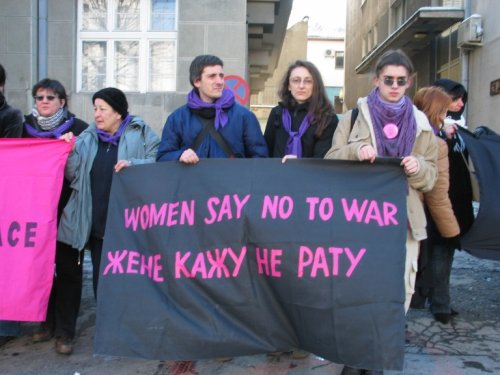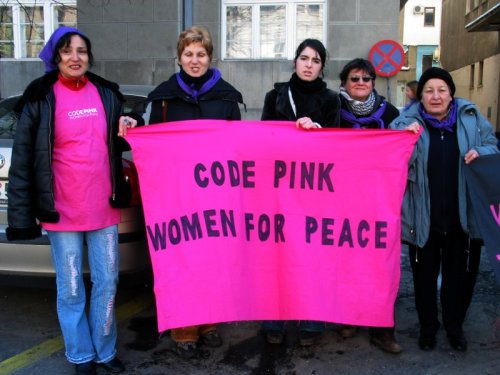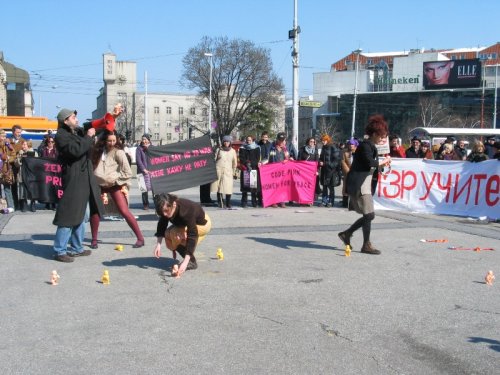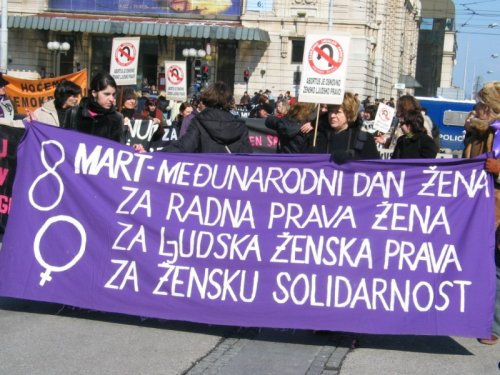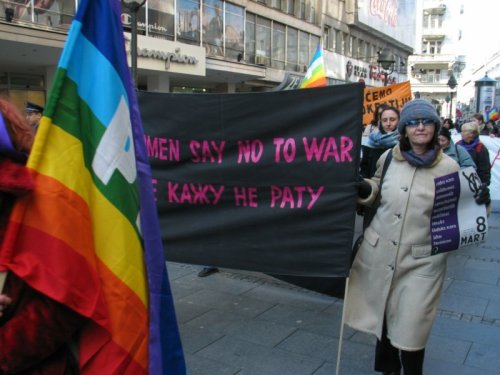Jasmina Tesanovic
Code Pink/ Women in Black, Belgrade
Sunny freezing day, 8th of March; at ten am sharp we spread our banners in front of the US embassy in Belgrade, facing the marines with machine guns and a few startled visa-seekers: Women Say No to War, Code Pink, Not In Our Names Not With Our Money, Women in Black.
Security gets nervous, but since we were on the other side of the street they can only warn us not to take any photos of them: we don’t, we take photos of our beautiful selves; it is a women's international day.
A pretty girl approaches us: Please, I am looking for this very famous hairdresser somewhere around here.
Dressed in pink and black, with our fuzzy hair and funny eyeglasses, we must seem the right people to ask.
- Who are you, she wonders
- We are women for peace
- Are you against Americans
- We are against all military
She gets it in a second: careful gals...they will shoot you from the windows from all sides like pigeons. And she runs away...
Two of us women enter the US embassy to meet the political matters person and deliver him the signatures we collected for the "Women say no to war" Code Pink international action. The meeting goes on for 45 minutes: the embassy person is eager to convince us, he claims he read everything about Code Pink and Women in Black initiatives, but he still thinks that peace can be brought by weapons, that powers like US have moral issues to intervene... Oil as blood, is that a moral issue?
Did you protest when NATO bombed you, he asks?
No Bush, No Saddam
No NATO, No Milošević
Back on the streets, to the Russian embassy: Nyet, not working day, says the single, sleepy guard... We have a letter to deliver, we women for peace, we protest against Putin who fights the Chechens and hosts our war criminals... Ha, says the guard, speaking between Serbian and Russian. Give it to me, I deliver tomorrow. No machine guns, no security, no official reply or refusal.
Russians do not even fake democracy as Americans do.
We rush to deliver a press conference on women who write against war, it is much attended, but the press has questions. So do we. In the Republic Square, a performance follows: international banners, lots of cameras and a personal security squad led by an elderly policeman not in uniform. He claims he is in charge of our safety and seems proud of it. Until recently police were our main source of danger. Wound-up Chinese baby dolls are squeaking in the middle of our circle, symbolizing the forced birth of a nation. Some male onlookers are sulking but in silence.
There are two kinds of globalization, we conclude at the Women in Black network workshop; a good one and a bad one.
When war and war crimes are committed in our names by different kinds of war fundamentalists, it is a bad one; when we gather together all over the planet to make sure they will not get away with that, it is a good one. Crime has no nationality, time, place, or border. Warriors of the world beware, women of all colors are everywhere... We don’t want your flowers. We demand your weapons.
Then we march the local streets of Belgrade to the Parliament. We are shouting Mladic to Hague, More condoms less religion, Crime has no nationality...
At the front door of the parliament a woman delegate is waiting for us: we are delivering two letters to the officials; one a women's security resolution and the other against financing the war criminals in Hague. Both ignored for months on end by the parliament. These are hot days in Serbia. Only two days ago the major leader and accomplice of the Serbian criminal regime, Milan Babic, now witness of the accusation, committed suicide in prison in Hague. Seems like an ordered suicide and Hague neglect.



